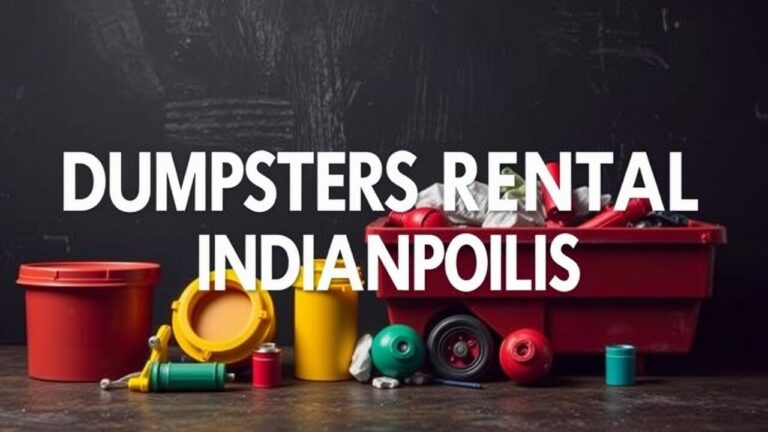How to Rent a Residential Dumpster in Indianapolis
Preparing for Dumpster Delivery
Before the dumpster arrives, it’s essential to clear designated space for it. Measure the area where you plan to place the dumpster to ensure it fits comfortably. A safe distance is necessary for the truck to maneuver, so avoid parking cars or placing any obstacles nearby. Ensure the ground is solid and level to provide a stable foundation.
Inform your neighbors about the delivery date and time. This courtesy helps prevent any conflicts over parking or space usage. Review local policies regarding sidewalk or street placement to ensure compliance and avoid penalties. Preparing the area ahead of time can streamline the unloading process, making it easier for the delivery team and minimizing any disruptions.
Guidelines for Making Space and Access
Ensure there is ample room for the dumpster at the delivery location. Measure the area where the dumpster will be placed, considering the dumpster’s dimensions along with any necessary space for the delivery truck. Maintain a clear path for the delivery truck to approach the site. Remove any obstacles such as vehicles, furniture, or landscaping items that could hinder access.
Check local regulations regarding placement restrictions. Some neighborhoods may have specific guidelines about where a dumpster can be situated. Avoid placing the dumpster too close to driveways, mailboxes, or fire hydrants to prevent any potential issues. Keeping safety and accessibility in mind will streamline the delivery process and facilitate a smooth rental experience.
Proper Usage of the Dumpster
Utilizing a residential dumpster effectively requires an understanding of best practices. Begin loading the dumpster with heavier items at the bottom. This helps distribute weight evenly and prevents the container from becoming unbalanced. Avoid overfilling the dumpster, as this can lead to safety hazards during transport. Keeping the load even is essential for ensuring that the dumpster can be safely hauled away.
It’s also crucial to be mindful of what materials are placed in the dumpster. Hazardous materials such as paints, chemicals, and batteries are not only prohibited in most rentals but also pose significant environmental risks. Ensure that items like electronics and appliances are disposed of according to local regulations. Being conscientious about what goes into the dumpster not only aids in responsible waste management but also helps avoid potential fines.
Do’s and Don’ts of Loading Residential Dumpsters
When loading a residential dumpster, organization is key. Begin with larger items, placing them at the bottom to create a stable base. This approach maximizes space and assists in keeping the load balanced. Distributing weight evenly across the dumpster helps prevent tipping during transportation. Aim to fill the dumpster to the recommended height without exceeding the top edge, which can lead to safety issues and possible fines.
It is essential to avoid placing hazardous materials inside the dumpster. Items like batteries, paints, and chemicals may pose risks to the environment and require special handling. Additionally, refrain from overfilling the dumpster, as it can increase the likelihood of debris falling out during transport. Make sure to consult the rental company regarding any specific restrictions to ensure compliance with regulations.
Understanding Local Regulations
Renting a dumpster involves adhering to local regulations that vary based on your specific area in Indianapolis. Each neighborhood may have different rules regarding placement, size limitations, and duration of rental. Understanding these requirements is crucial, as failure to comply can result in fines or complications during your waste disposal process. It’s advisable to contact your local municipal office or visit their website to gather the necessary information before proceeding with your rental.
In addition to general regulations, specific restrictions often pertain to the types of materials that can be disposed of in a dumpster. Most areas prohibit hazardous waste, including chemicals and certain electronics. Familiarizing yourself with these guidelines not only ensures compliance but also promotes responsible waste management. Many rental companies also provide a list of accepted items, which serves as a helpful resource when preparing your materials for disposal.
Rules and Restrictions for Dumpster Rentals
Renting a dumpster in Indianapolis comes with specific regulations that ensure safety and compliance with local laws. It is essential to choose a container that fits your project’s needs while adhering to size restrictions imposed by rental companies. Most municipalities mandate that dumpsters be placed on a flat, stable surface to prevent tipping. Additionally, you may need to secure a permit if you plan to place the dumpster on public property, such as a street or sidewalk, which can involve fees and specific guidelines.
Certain materials are prohibited from being disposed of in residential dumpsters, including hazardous waste, tires, or appliances. Understanding these restrictions is crucial to avoid penalties and ensure proper disposal. Rental companies often provide a list of acceptable and prohibited materials, which should be reviewed before loading the dumpster. Failure to comply with these regulations can result in additional charges or legal consequences.
Managing Waste Disposal Responsibly
Embracing responsible waste disposal practices is essential for sustainable living. Sorting materials before placing them in the dumpster can greatly reduce the amount of waste that ends up in landfills. Designate separate containers for recyclable items like paper, cardboard, plastics, and metals. This not only helps in minimizing landfill contributions but also promotes eco-friendly methods. Many recycling centers offer convenient pickup service, which can simplify the process.
Properly managing the contents of your dumpster can also prevent potential fines. Familiarize yourself with the list of prohibited items for your rental. Hazardous materials, such as paint, chemicals, and electronics, should never be disposed of in residential dumpsters. Local disposal facilities often have special programs or designated days for safely getting rid of these types of waste. Taking these extra steps reinforces a commitment to the environment and fosters a sense of community responsibility.
Tips for Sorting and Recycling Your Waste
Sorting your waste before disposing of it in a residential dumpster can significantly enhance recycling efforts. Start by designating separate containers for different materials such as paper, plastic, metal, and organic waste. Familiarizing yourself with local recycling guidelines can help ensure that these materials are processed correctly. Check with your local waste management service for specific requirements, as some areas have unique rules regarding recyclable items.
When loading the dumpster, keep in mind the importance of maximizing space while maintaining proper separation. Place larger cardboard boxes flat to save room and stack items intelligently. Avoid throwing in non-recyclable materials that could contaminate recyclable loads unless the dumpster is specifically designated for mixed waste. By being conscientious about what you throw away, you can contribute to a greener environment and potentially lower disposal costs.
FAQS
What sizes of dumpsters are available for rent in Indianapolis?
In Indianapolis, residential dumpsters typically come in a range of sizes from 10 to 40 cubic yards. The size you choose will depend on the scope of your project and the amount of waste you expect to generate.
How long can I rent a dumpster for?
Most dumpster rental companies in Indianapolis offer flexible rental periods, usually ranging from a few days to a couple of weeks. You can often extend the rental period for an additional fee if needed.
Do I need a permit for a dumpster rental in Indianapolis?
It depends on where you place the dumpster. If it’s on private property, a permit is generally not required. However, if you need to place it on a public street or sidewalk, you will likely need to obtain a permit from the city.
What items are prohibited from being placed in a residential dumpster?
Commonly prohibited items include hazardous materials (like chemicals and batteries), appliances (such as refrigerators), tires, and electronics. Always check with your dumpster rental company for a full list of restricted items.
How can I ensure that my waste is disposed of responsibly?
To manage waste disposal responsibly, sort your materials into recyclable, reusable, and landfill waste. Many companies offer recycling options, so consider working with a provider that supports eco-friendly practices to minimize landfill impact.







